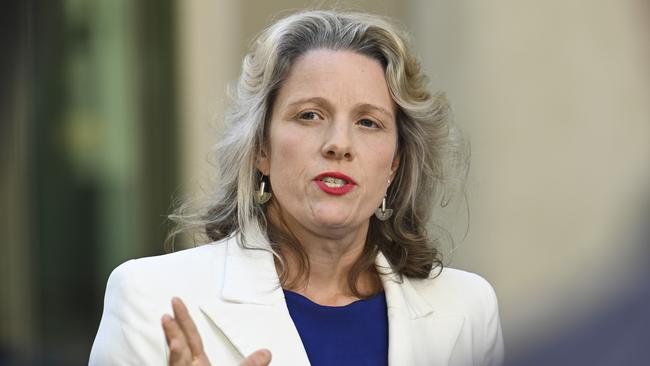Student visa slowdown ‘could push us towards a recession’, warns international education industry
Home Affairs Minister Clare O’Neil is warned her push to cut migration by slowing down student visa processing is causing severe economic damage.

The international education industry has warned Home Affairs Minister Clare O’Neil that the government’s push to reduce migration by slowing down student visa processing is causing severe economic damage, including loss of jobs, which could push Australia towards recession.
In a joint letter to Ms O’Neil dated April 15, eight peak bodies in the international education sector say the policy risks doing “lasting damage” to the Australian economy, the balance of trade and Australia’s reputation as a host country for students.
Ms O’Neil justified the student visa slowdown, saying international education had “significant issues with fraud, migrant worker exploitation, false asylum claims and other problematic migration outcomes”.
In a statement to The Australian in response to the letter, she said education was “a critically important export that over the last decade has been greatly undermined by dodgy providers engaging in a free for all. We will help providers work through these changes, but we will not shy away from making them.”
In their letter, the peak education bodies said they noted and endorsed Ms O’Neil’s “priority to emphasise quality of students over quantity. Nonetheless, we believe that visa processing issues are leading to a number of unintended and damaging consequences.
“These constraints risk pushing Australia towards a recession should they not be quickly improved.”
International student numbers have boomed since Australia opened its borders after the Covid shutdown and last year education exports hit a record $48bn; growth in consumption from an increasing numbers of students was the main factor that prevented us sinking into recession last year.
Spending by international students was responsible for 0.8 per cent growth in GDP in 2023, more than half of the very sluggish total growth in the economy last year of 1.5 per cent.
The letter – jointly signed by English Australia, Independent Higher Education Australia, Independent Schools Australia, Independent Tertiary Education Council Australia, the International Education Association of Australia, the Victorian Department of Education, TAFE Directors Australia and Universities Australia – also said the visa processing slowdown was hurting many high quality education providers, including universities, while regulators had not yet cracked down on some low quality, dodgy colleges.
The slowdown in visa processing, and rise in the visa refusal rate, followed a ministerial directive issued by Ms O’Neil on December 14 that instructed migration officers to prioritise visa processing for students enrolling with education providers with the least risk under the government’s visa risk assessment system.
Shortages of visa staff led to a wider slowdown and tens of thousands of students who would have been accepted on past criteria were not processed or rejected.
International Education Association of Australia CEO Phil Honeywood said the fact at all peak bodies supported the letter was “evidence of the incredible negative impact that the recent round of visa processing has had” and he warned it could get worse.
“The implications of a similar situation impact on mid year student intakes may well force the closure of many long established quality education providers.”
In February 16 universities told Ms O’Neil that the visa slowdown would cost them $310m in lost fees this year from international students. Since then a broader group of universities has estimated the combined revenue loss this year will be at least $500m unless the government moves quickly to change its decision to slow down student visa processing.




To join the conversation, please log in. Don't have an account? Register
Join the conversation, you are commenting as Logout